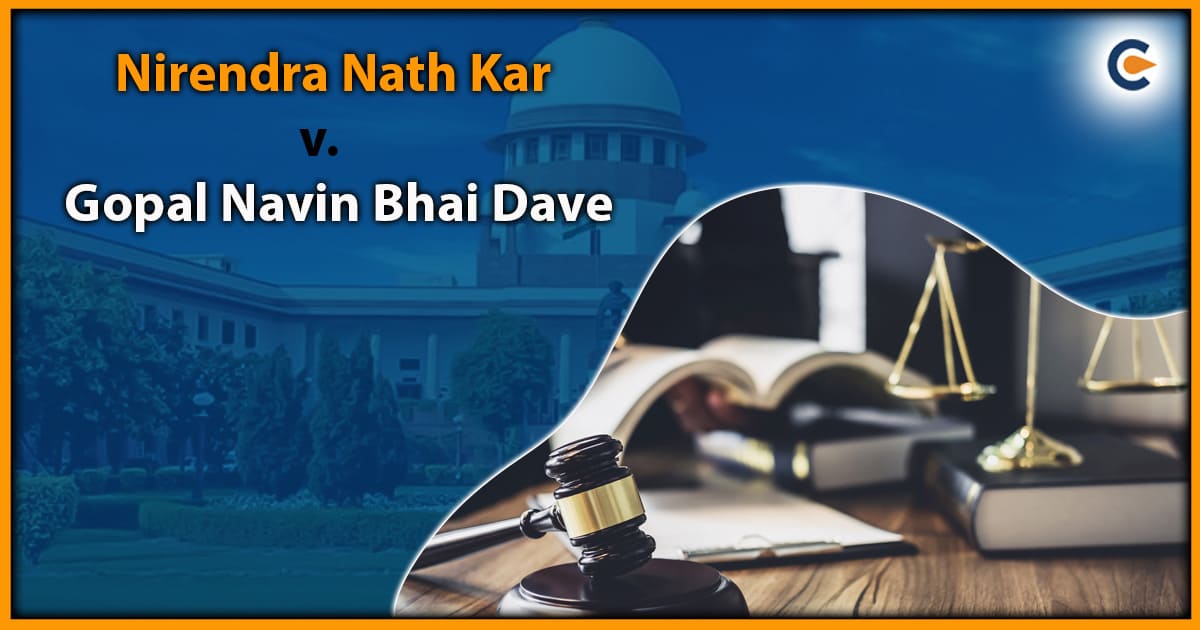Appeal for restoration of Co.’s name can’t be maintained by a person whose status as its director is disputed: Supreme Court
In this instance, the Supreme Court made the determination to decline an appeal aiming to restore the name of a company that had been previously deemed nonoperational. The crucial aspect that led to the appeal’s dismissal was the appellant’s disputed status as a director of the company. The court firmly established that an individual whose position as a director is in doubt or subject to dispute does not possess the legal authority to maintain such an appeal. This ruling underscores the significance of having a clear and undisputed directorship status before initiating legal proceedings on behalf of a company. As discussed in Nirendra Nath Kar v. Gopal Navin Bhai Dave case
The ruling from the court acts as a prompt to remember the significance of ensuring the validity and legitimacy of directorial positions when undertaking legal actions related to corporate matters.
Background
In the case of Nirendra Nath Kar v. Gopal Navin Bhai Dave, the information provided highlights the background and sequence of events related to the company in question. Basanti Cotton Mills Private Limited was incorporated with three directors and had an authorized share capital of Rs.10,00,000 divided into 1,00,000 equity shares. Subsequently, the company changed its name to Basanti Cotton Mills (1998) Private Limited on 3rd March 2000.
The company filed its last annual return and audited accounts for the financial year 2002-2003 with the Registrar of Companies. However, based on the provisions of Section 560(5) of the Companies Act, 1956, the Registrar of Companies struck off the name of the company on 27th January 2006.
This step was initiated upon the request of the respondents, who were the directors of the company. The specific reasons for the name being struck off are not mentioned, but it can be assumed that non-compliance, lack of proper functioning, or failure to carry out business activities might have contributed to this decision.
Facts of the Case
- The RoC struck off the name of Basanti Cotton Mills (1998) Private Limited under section 560(5) of the Companies Act, 1956.
- The RoC claimed that the company was not functioning correctly and had not conducted any business.
- The last annual return filed for the company was for the year 2002-2003.
- The appellant, one of the directors of the company, filed a complaint before the High Court in 2010 under section 560(6) of the Companies Act, 1956.
- The High Court allowed the application and restored the name of the company, citing non-compliance with the prescribed procedure under section 560 of the Companies Act, 1956.
- An appeal was then filed with the Supreme Court challenging the High Court’s decision.
Arguments
During the proceedings, the respondent’s counsel argued that the name of the company had been struck off long ago, and according to the last balance sheet from 2003, the paid-up share capital had dwindled to Rs. 7000/-. Referring to Section 3 of the Companies Act 1956[1], it was stated that companies with such reduced capital were considered defunct. Furthermore, it was emphasized that sixteen years had passed since the company’s name was struck off in 2006, and there was little justification for restoring its name at this stage. The lack of any business operations by the company further supported the argument against reinstating its name. The counsel asserted that reviving the company’s status was unreasonable given these circumstances.
Decision
In this case Nirendra Nath Kar v. Gopal Navin Bhai Dave, the division bench consisting of Justice Ajay Rastogi and Justice B.V. Nagarathna reviewed the proceedings of the Division Bench of the High Court and their judgment. They noted that the High Court had based its findings on the facts presented in the affidavit submitted by the Registrar of Companies (RoC). The High Court had explicitly determined the appellant’s legal standing to challenge the Registrar’s order to strike off the company’s name under Section 560(5) of the Companies Act, 2003.
The Supreme Court observed that, at this stage of the proceedings, it was challenging to rely on the documents submitted by the appellant to establish their directorial position within the company. The court carefully considered the available evidence and took into account the findings of fact recorded by the Division Bench of the High Court in their judgment.
After a thorough examination, the Supreme Court found no justifiable reason to interfere with the conclusions reached by the High Court. Therefore, the court upheld the High Court’s decision and dismissed the appeal. This highlights the importance of presenting reliable evidence and establishing a clear directorial position in legal proceedings to ensure the validity and credibility of the claims made on behalf of a company.
Conclusion
In this case Nirendra Nath Kar v. Gopal Navin Bhai Dave, the Supreme Court dismissed the appeal seeking the restoration of a company’s name that had been struck off as defunct. The court emphasized that the appellant’s disputed status as a director deprived them of the legal standing to maintain such an appeal. The ruling from the court acts as a prompt to remember the significance of establishing a valid directorship status before pursuing legal actions on behalf of a company. The court upheld the decision of the High Court, which had set aside the Registrar of Companies’ order and restored the company’s name. The Supreme Court found no grounds to interfere with the High Court’s findings and upheld the dismissal of the appeal.
Read our Article: Register Of Members Under The Companies Act, 2013











